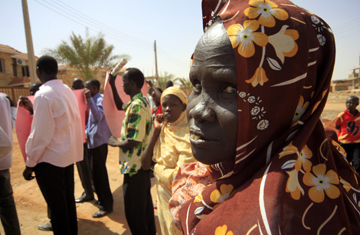
A southern Sudan woman stands near students from the southern oil region of Abyei who are demonstrating in Khartoum against the delay of the referendum, Nov. 4, 2010
"From what those to the north are saying, I think they want to fight," says Flak Majok Yak, a 33-year-old schoolteacher eating in the central market of Abyei town. Abyei is often referred to as Sudan's "bridge," the crossroads between the nation's Arab-dominated Islamic north and the non-Muslim black African south — but it can be more accurately described as Sudan's battlefield. For most of the past 50 years, Sudan's two regions have been at war, and this town of thatch huts and leaning stick fences was caught in the crosshairs. Now Abyei is once again at the center of a conflict, one that threatens the stability of a 2005 peace deal — and could force the U.S. to strengthen ties with one of the world's most shunned states in an effort to peacefully secure the world's newest one.
Lush and green, Abyei is where the fertile floodplain of South Sudan meets the petering desert of the north, and is a case in point for all that has gone wrong with Africa's largest nation since its inception. Traditionally this land was shared in peace, permanently inhabited by the Ngok Dinka — ethnically southerners — and seasonally home to the Arab Misseriya nomads, who migrate to the area during the dry months. But years of war have left this symbolic bridge burned beyond repair, and the Ngok Dinka want to make the separation official.
Technically, they can. South Sudan plans to secede in a referendum next year, exercising a right granted under a 2005 peace deal to form its own country. Abyei was promised its own referendum to decide which side to join. But the Arab Misseriya leaders have vowed to block any referendum unless they too are allowed to vote — they worry that the split will result in their losing grazing land despite assurances from the south that traditional rights will be respected. To make their point, Misseriya militias are menacingly amassing north of Abyei town.
The U.S is trying to break the impasse, fearing that if fighting breaks out in Abyei, it could spread across the rest of the borderlands. Key oil fields are in the vicinity, and both sides are thought to be sending more forces to the area. Nine days of U.S.-mediated negotiations in Ethiopia last month failed to reach any agreement. And U.S. State Department spokesman P.J. Crowley admitted last Tuesday that holding the Abyei vote is looking "increasingly problematic." The momentum is toward a political deal instead, likely involving ceding part or all of Abyei to the south in exchange for granting the Misseriya dual citizenship and giving a percentage of oil revenues to the north. Meanwhile, other key negotiations on the southern secession have stalled, including what compensation the north will receive for giving up its claim to the south's large oil reserves, which account for roughly 80% of Sudan's total production.
In the hope of getting Sudan President Omar al-Bashir's government to play ball, U.S. President Barack Obama offered in September to take steps to normalize ties with Sudan if the voting goes smoothly and the conflict in Darfur is resolved. More recently, in a proposal presented by Senator John Kerry during a visit to Khartoum Nov. 5-7, the U.S. offered to remove Sudan from its list of state sponsors of terrorism as early as the middle of next year if the issue of Abyei is resolved peacefully and South Sudan's referendum is respected.
Some are skeptical that the offer will make much difference. The sponsor-of-terrorism label carries a number of economic and political prohibitions, but removing it might be more of a symbolic gain for Khartoum than an economic one — the U.S. won't lift sanctions until the Darfur conflict is ended. "In the Sudanese government's eyes, what Kerry brought to Khartoum asks far too much for far too little in return," says Bayless Parsley, an Africa analyst at the Austin-based global-intelligence company Stratfor.
To residents of Abyei, the whole ordeal feels like a bad case of déjà vu. They were promised this referendum before in a 1972 peace deal, but the vote, like now, was never organized. And they have grown used to the attacks of Arab militias, who over the past half-century have steadily driven the Ngok Dinka southward from the oil fields. Even after the 2005 cease-fire, in May 2008, northern forces stormed the town and razed the area to the ground, killing at least 89 and displacing 90,000. The attack had been sparked by a minor clash with the south's army after both sides failed to withdraw from the area as agreed under the pact.
This time, say the Ngok Dinka, they will make a final stand as they have no more land to give. "We are a peaceful people, but we won't give up our rights," says Kuol Deng Kuol, head of the Ngok Dinka, sitting in his Abyei home. The annual Misseriya migration has begun. Soon, they will reach Abyei, and chief Kuol says they are not welcome this year until a deal is reached. If they try to come by force, the people of Abyei will resist, he says.
In a dirt plot nearby, Kueth Malual Ayom rolls a gas canister on its side to sit on as she talks. She lost her husband in the 2008 attack. When asked about the coming migration, her eyes flash. "Our men must not let them come," she says. "If I had the powers of a man, I would fight them."
